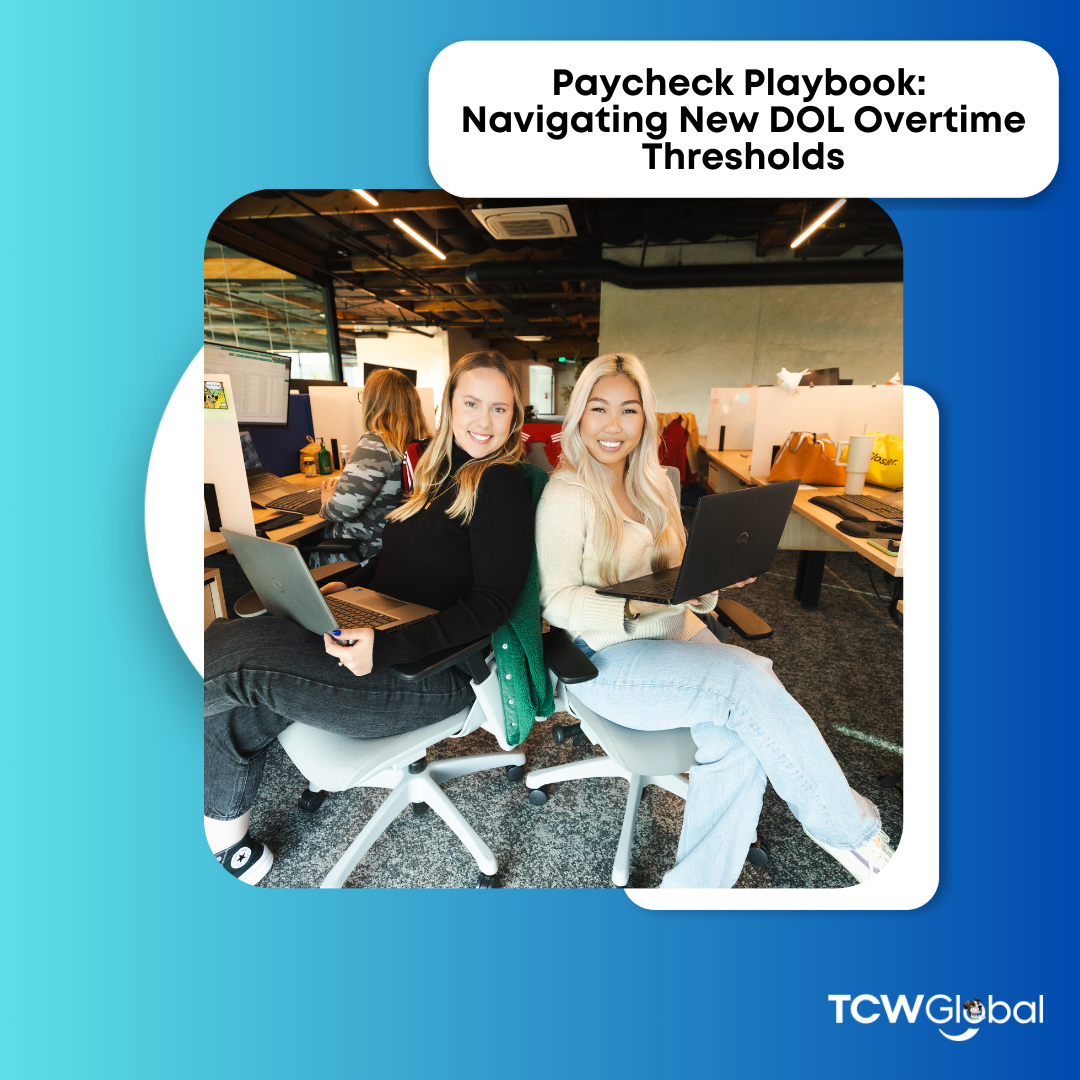Paycheck Playbook: Navigating New DOL Overtime Thresholds
April 24, 2024

Overtime. It isn’t just what athletes do to win a game.
In real life - in the context of our jobs - it means staying late at the restaurant, starting early at the construction site, or taking on additional shifts at the shop.
For salaried employees who are exempt from overtime, working extra hours doesn't mean extra pay. However, starting in July 2024, important changes are coming that will affect the baseline salary of these employees. These adjustments are designed to ensure salaries remain fair and competitive with economic changes.
Quick Overview:
- Big Changes to the DOL Overtime Rule
- Here's What's Changing
- Challenges Ahead
- Summing it Up
- Stay on Top of Your Game with TCWGlobal
As businesses gear up for these changes, here’s what you need to know to stay ahead:
Big Changes to the DOL Overtime Rule
Starting in July 2024, the Department of Labor (DOL) is making big changes to the rules that decide who qualifies as executive, administrative, and professional (EAP) workers under the Fair Labor Standards Act. These changes mean that employees will need to earn higher salaries to be exempt from overtime pay. Plus, the rules will automatically adjust every three years to match changes in the economy.
Here’s What’s Changing:
New Pay Threshold for Salaried Workers
Starting July 1st, 2024, the salary threshold federally for executive, administrative, and professional exemptions (“white collar” exemptions) will be increased to $844 per week ($43,888 annually), a significant boost from the original $684. Six months later, on January 1st, 2025, the salary threshold will increase to $1,128 per week ($58,656 annually).
Pay Increases for Higher Earners
Additionally, highly compensated workers must earn approximately $50,000 more by 2025 to continue to qualify as salary exempt. Beginning on July 1, 2024, the total annual compensation for a highly compensated worker will increase from $107,432 to $132,964; however, by January 1, 2025, they must make $151,164.
Automatic Salary Exempt Threshold Increases
This rule will update automatically every three years according to these thresholds. The rule is intended to be flexible enough to accommodate shifts in worker salary and provide businesses with a predictable timetable for future adjustments. The first updates will begin on July 1, 2027, and occur every three years after that.
.png?width=1080&height=1080&name=Blog%20Header%20Image%20(9).png)
Challenges Ahead
The Department of Labor (DOL) is set to face several legal challenges with the new overtime rule. The public, courts, and Congress will closely examine this rule, especially with the upcoming elections adding to the uncertainty. Changes in presidential administrations could influence how Congress reviews these changes, making the situation even more unpredictable.
Summing it Up
Despite potential legal challenges, employers must prepare to adjust salaries by July 1st, 2024. To remain exempt from overtime, white-collar workers will need to earn at least $43,888 annually, while highly compensated individuals must make at least $132,964. These are just the initial adjustments; from 2027 onwards, salary thresholds will automatically update to align with economic conditions. TCWGlobal is closely monitoring these changes to help our contingent workforce and partners maintain compliance.
Stay on Top of Your Game with TCWGlobal
Understanding these changes is just the beginning. Implementing them effectively is where TCWGlobal excels. With over 15 years of experience in regulatory compliance and workforce management, we’re equipped to guide your business through these evolving standards. Our proprietary software and expert teams ensure that your business remains compliant, regardless of how the regulatory winds may shift.
To get ahead of these changes and ensure seamless transitions, reach out to our global support team at (858) 810-3000 or hello@tcwglobal.com.
For detailed information about the DOL’s new rule, visit this resource: DOL’s Final Overtime Rule.
